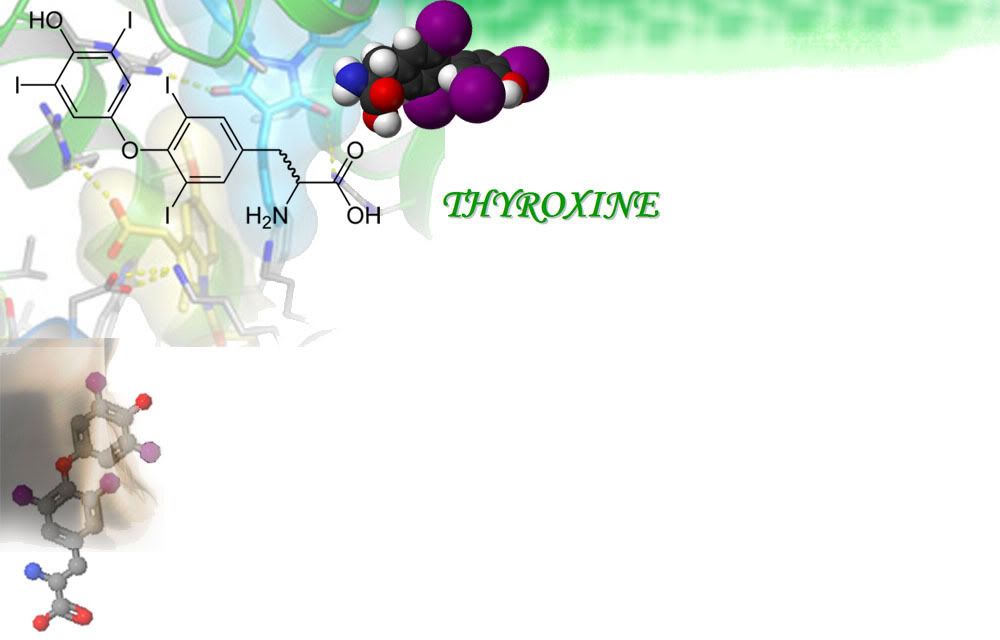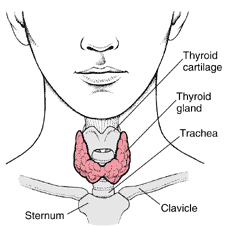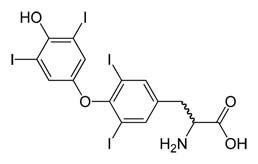
Saturday, February 17, 2007
HYPOTHYROIDISM
Causes of Hypothyroidism
The causes of hypothyroidism were varied, and appear from the readings to relate both to true hypothyroidism as well as "incoordination" of the glandular system.
Commonly, a spinal imbalance was suggested as the cause. A nutritional deficiency, usually caused by dietary lack, but sometimes caused by improper assimilation, was also suggested. Mental excitement, acting on the sympathetic nervous system, was causative in some cases and contributory in others.
Lack of normal circulation through the gland itself was also mentioned as a cause for certain individuals. This lack of circulation was often related to the aforementioned spinal imbalance. Finally, improper eliminations, or incoordination between assimilation and elimination, was suggested as a cause of hypothyroidism for some people.
Medically speaking, we know only a few of the causes of hypothyroidism. Lack of dietary iodine or an excess of inorganic iodine can each cause a decrease in thyroid function. Certain antithyroid substances, such as the drug thiocyanate and the herb bugelweed, will decrease thyroid function. There are many other cases of hypothyroidism and hidden hypothyroidism for which a cause cannot be identified.
Treatment recommendations
Treatments differ from person to person. Diet was mentioned most often. All carbonated drinks, fried foods and alcohol were to be eliminated. Often, citrus fruits or their juices were suggested. On occasion, additional calcium was suggested, usually in dietary form but sometimes as a supplement called Calcios. In general, the basic diet was favored for glandular imbalances, including hypothyroidism.
Spinal manipulation (osteopathic) and massages were mentioned with similar frequency. Often, they were to be given in combination with each other. The exact areas of the spine that needed correction were different in each patient.
Atomidine and thyroid extract were both recommended 25% of the time for true hypothyroid conditions. In many other cases of "incoordination of the glands," atomidine was recommended almost exclusively. It appears that thyroid extract was sometimes needed when the gland was underproducing thyroid. Thyroid replacement by means of thyroid extract requires medical supervision.
Thyroid extract (U.S.P. thyroid) is a prescription medication. Self-prescribed thyroid medication can be dangerous. An overdose of thyroid medication can cause heart irregularities and other problems such as osteoporosis. Even Atomidine must be used with care. It is probably best used under the advice of a sympathetic physician.
Small doses of iodine can stimulate (and, according to Cayce, normalize) thyroid function. Large doses of iodine can suppress thyroid function. This is why bottles of Atomidine caution not to take internally except under the advice of a physician. Atomidine and thyroid extract are not to be used together. The combination could result in excess stimulation and worsen a glandular imbalance.
Attitudes and emotions needed to be constructive, or else an imbalance in the nervous system would result in a glandular imbalance. Correction of attitude was also recommended some 25% of the cases. In the metabolism disturbance we find there are the effects through the nervous system, through worry, through overanxiety here or there, that bring on the greater disturbance.
grow with me 7:49 PMCauses of Hypothyroidism
The causes of hypothyroidism were varied, and appear from the readings to relate both to true hypothyroidism as well as "incoordination" of the glandular system.
Commonly, a spinal imbalance was suggested as the cause. A nutritional deficiency, usually caused by dietary lack, but sometimes caused by improper assimilation, was also suggested. Mental excitement, acting on the sympathetic nervous system, was causative in some cases and contributory in others.
Lack of normal circulation through the gland itself was also mentioned as a cause for certain individuals. This lack of circulation was often related to the aforementioned spinal imbalance. Finally, improper eliminations, or incoordination between assimilation and elimination, was suggested as a cause of hypothyroidism for some people.
Medically speaking, we know only a few of the causes of hypothyroidism. Lack of dietary iodine or an excess of inorganic iodine can each cause a decrease in thyroid function. Certain antithyroid substances, such as the drug thiocyanate and the herb bugelweed, will decrease thyroid function. There are many other cases of hypothyroidism and hidden hypothyroidism for which a cause cannot be identified.
Treatment recommendations
Treatments differ from person to person. Diet was mentioned most often. All carbonated drinks, fried foods and alcohol were to be eliminated. Often, citrus fruits or their juices were suggested. On occasion, additional calcium was suggested, usually in dietary form but sometimes as a supplement called Calcios. In general, the basic diet was favored for glandular imbalances, including hypothyroidism.
Spinal manipulation (osteopathic) and massages were mentioned with similar frequency. Often, they were to be given in combination with each other. The exact areas of the spine that needed correction were different in each patient.
Atomidine and thyroid extract were both recommended 25% of the time for true hypothyroid conditions. In many other cases of "incoordination of the glands," atomidine was recommended almost exclusively. It appears that thyroid extract was sometimes needed when the gland was underproducing thyroid. Thyroid replacement by means of thyroid extract requires medical supervision.
Thyroid extract (U.S.P. thyroid) is a prescription medication. Self-prescribed thyroid medication can be dangerous. An overdose of thyroid medication can cause heart irregularities and other problems such as osteoporosis. Even Atomidine must be used with care. It is probably best used under the advice of a sympathetic physician.
Small doses of iodine can stimulate (and, according to Cayce, normalize) thyroid function. Large doses of iodine can suppress thyroid function. This is why bottles of Atomidine caution not to take internally except under the advice of a physician. Atomidine and thyroid extract are not to be used together. The combination could result in excess stimulation and worsen a glandular imbalance.
Attitudes and emotions needed to be constructive, or else an imbalance in the nervous system would result in a glandular imbalance. Correction of attitude was also recommended some 25% of the cases. In the metabolism disturbance we find there are the effects through the nervous system, through worry, through overanxiety here or there, that bring on the greater disturbance.

